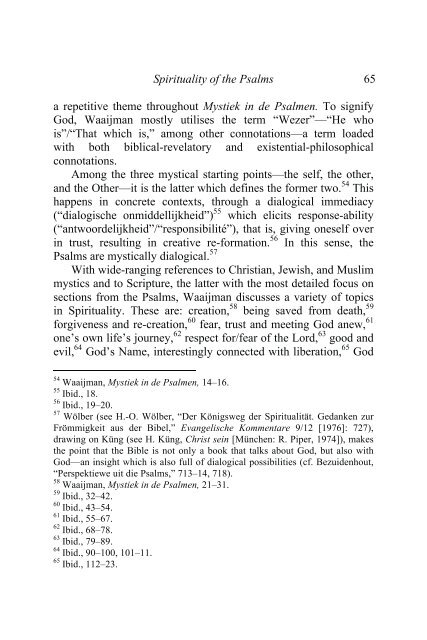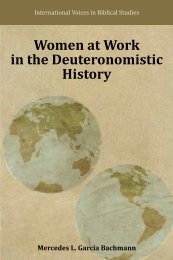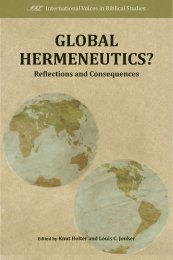The Old Testament and Christian Spirituality - International Voices in ...
The Old Testament and Christian Spirituality - International Voices in ...
The Old Testament and Christian Spirituality - International Voices in ...
Create successful ePaper yourself
Turn your PDF publications into a flip-book with our unique Google optimized e-Paper software.
<strong>Spirituality</strong> of the Psalms 65<br />
a repetitive theme throughout Mystiek <strong>in</strong> de Psalmen. To signify<br />
God, Waaijman mostly utilises the term “Wezer”—“He who<br />
is”/“That which is,” among other connotations—a term loaded<br />
with both biblical-revelatory <strong>and</strong> existential-philosophical<br />
connotations.<br />
Among the three mystical start<strong>in</strong>g po<strong>in</strong>ts—the self, the other,<br />
<strong>and</strong> the Other—it is the latter which def<strong>in</strong>es the former two. 54 This<br />
happens <strong>in</strong> concrete contexts, through a dialogical immediacy<br />
(“dialogische onmiddellijkheid”) 55 which elicits response-ability<br />
(“antwoordelijkheid”/“responsibilité”), that is, giv<strong>in</strong>g oneself over<br />
<strong>in</strong> trust, result<strong>in</strong>g <strong>in</strong> creative re-formation. 56 In this sense, the<br />
Psalms are mystically dialogical. 57<br />
With wide-rang<strong>in</strong>g references to <strong>Christian</strong>, Jewish, <strong>and</strong> Muslim<br />
mystics <strong>and</strong> to Scripture, the latter with the most detailed focus on<br />
sections from the Psalms, Waaijman discusses a variety of topics<br />
<strong>in</strong> <strong>Spirituality</strong>. <strong>The</strong>se are: creation, 58 be<strong>in</strong>g saved from death, 59<br />
forgiveness <strong>and</strong> re-creation, 60 fear, trust <strong>and</strong> meet<strong>in</strong>g God anew, 61<br />
one’s own life’s journey, 62 respect for/fear of the Lord, 63 good <strong>and</strong><br />
evil, 64 God’s Name, <strong>in</strong>terest<strong>in</strong>gly connected with liberation, 65 God<br />
54<br />
Waaijman, Mystiek <strong>in</strong> de Psalmen, 14–16.<br />
55<br />
Ibid., 18.<br />
56<br />
Ibid., 19–20.<br />
57<br />
Wölber (see H.-O. Wölber, “Der Königsweg der Spiritualität. Gedanken zur<br />
Frömmigkeit aus der Bibel,” Evangelische Kommentare 9/12 [1976]: 727),<br />
draw<strong>in</strong>g on Küng (see H. Küng, Christ se<strong>in</strong> [München: R. Piper, 1974]), makes<br />
the po<strong>in</strong>t that the Bible is not only a book that talks about God, but also with<br />
God—an <strong>in</strong>sight which is also full of dialogical possibilities (cf. Bezuidenhout,<br />
“Perspektiewe uit die Psalms,” 713–14, 718).<br />
58<br />
Waaijman, Mystiek <strong>in</strong> de Psalmen, 21–31.<br />
59 Ibid., 32–42.<br />
60 Ibid., 43–54.<br />
61 Ibid., 55–67.<br />
62 Ibid., 68–78.<br />
63 Ibid., 79–89.<br />
64 Ibid., 90–100, 101–11.<br />
65 Ibid., 112–23.




